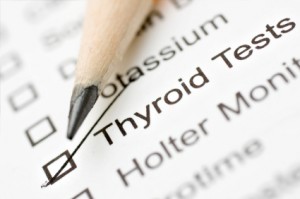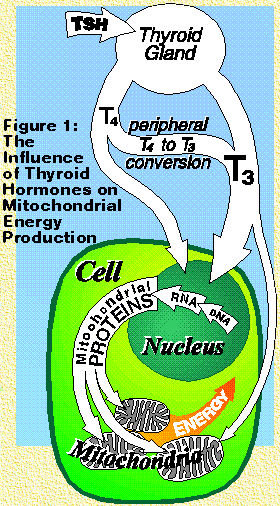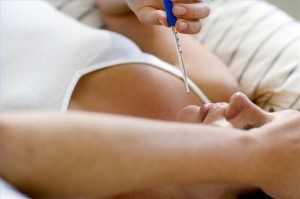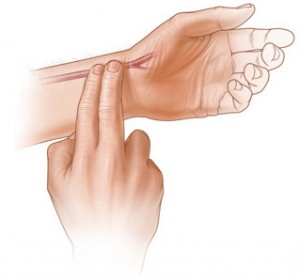The Best Test for Hypothyroidism
Written by Tom Brimeyer | Posted in Health Problems | 17 Comments
 I recently covered the many reasons why all thyroid tests suck and why you CANNOT rely on them to accurately diagnose hypothyroidism or to even monitor your thyroid function. The good news is that there’s a better way and it’s actually quite simple. I’m going to share with you how I work with my clients using the best test for hypothyroidism.
I recently covered the many reasons why all thyroid tests suck and why you CANNOT rely on them to accurately diagnose hypothyroidism or to even monitor your thyroid function. The good news is that there’s a better way and it’s actually quite simple. I’m going to share with you how I work with my clients using the best test for hypothyroidism.
With the billions of dollars invested each year in medical research and the amazing advancements in medical technology, you would think that we would be able to diagnose hypothyroidism today with 99% accuracy. Heck, I’d even settle for 85% accuracy but we’re still missing that mark by a long shot.
Let me tell you, computer technology today may be advancing at light speed but in many other areas of technology we’re still scratching our heads.
It reminds me of my days as an engineer when I was introduced to a navigational program that was still using navigational technology developed by German scientists 70 years ago during WWII. For the past 70 years American scientists have been trying to improve this German design and have achieved nothing but 70 years of failure.
Sometimes, it’s what we don’t know that slows technological advancement, but when it comes to healthcare, more often than not it’s ignorance that impedes progress.
How is it that we are told that running is the best way to burn calories and lose weight yet Russian scientists have shown that you can burn just as many calories, or more, by simply walking for the same amount of time? Sounds crazy, right? I’ll tell you more about that later.
In the same respect, it’s ignorance that allows us to continue to rely on inaccurate thyroid testing while ignoring a simple test that was developed 70 years ago to more accurately diagnose hypothyroidism.
Low Body Temperature and Hypothyroidism
Low body temperature is an epidemic problem. I have personally talked with nurses and have heard stories from others in the medical field who chart temperatures all day long and who openly admit that it’s rare to find anyone today with a 98.6°F temperature unless fever is present.
Low body temperature is more often than not, an indicator of hypothyroidism.
Am I saying that everyone today is hypothyroid? Of course not, but it’s well known that hypothyroid people get sick more often and are far more likely to develop health complications and disease. So, it should be understandable that the majority of people being seen in hospitals and doctors’ offices for health problems today are far more likely to be hypothyroid.
 Your thyroid is responsible for controlling and regulating a large number of functions within your body including:
Your thyroid is responsible for controlling and regulating a large number of functions within your body including:
- Metabolism and Heat Production
- Circulatory System and Blood Volume
- Muscular Health
- Nerve Health
- Digestive Health
- Health of Every Organ
- Health of Every Tissue
- Health of Every Cell
But today, we don’t even stop to consider the potential impact that thyroid health has on every function of the human body, and instead we only focus on its impact on our metabolism and our ability to lose weight.
Every cell in your body relies on thyroid hormone to produce energy and remain healthy. When your cells use thyroid hormone they produce more energy and therefore more heat. When your cells are starved of thyroid hormone, they produce less energy and therefore less heat.
By simply measuring the heat that your cells, or body, produce at rest can give you direct insight into how much thyroid hormone your cells are actually using.
And as I’ve mentioned many times before, TSH tests, blood tests, and all other thyroid tests DO NOT tell you how much thyroid hormone your cells are actually using, which is the only true way to accurately diagnose hypothyroidism.
The Basal Body Temperature Test
The basal body temperature test was first pioneered by Dr. Broda Barnes who was one of the early American physicians to recognize that hypothyroidism was being severely undiagnosed by modern medicine.
He spent more than 50 years researching and proving that hypothyroidism was the underlying cause of heart disease today. Even though nobody has been able to invalidate his research, his work has been, and continues to be, completely ignored by the medical community today.
In 1942 he published a study demonstrating the effectiveness of basal temperature in diagnosing hypothyroidism and its ability to prevent wrong diagnoses that have led to unnecessary operations to remove the thyroid gland which can lead to severe health complications.
BASAL TEMPERATURE VERSUS BASAL METABOLISM
http://jama.jamanetwork.com/article.aspx?volume=119&issue=14&page=1072
SUMMARY 1. From a study of over 1,000 cases the results indicate that subnormal body temperature is a better index for thyroid therapy than the basal metabolic rate. 2. The differential diagnosis between hypothyroidism and hyperthyroidism is sometimes difficult. In 7 cases reported the diagnosis was wrong, in 5 of which an operation had been performed. The temperature was subnormal in each case.
Why Your Doctor Doesn’t Want You Taking Your Own Temperature
If measuring your basal body temperature is so simple and effective, then why does your doctor dismiss its relevancy?
There are two reasons which are quite simple…
- Your doctor didn’t go through 8 years of school and 3 to 5 years of residency just to let his or her patients self-diagnose themselves by simply using a thermometer. Of course not, and doctors understand that they have to protect their profession because they are the so-called “experts” when it comes to your health, not you.What would the world become if people started taking a more active role in their own healthcare and demand proper treatment? What a scary world that would be.So, instead of even trying to argue the relevancy of basal temperature, modern medicine has chosen to turn a blind eye and simply ignore it altogether.
- Healthcare today is a business. And like any business, they want to maximize their profits. How much money do they stand to make by having you take your own temperature?Absolutely nothing…It’s much more profitable to charge you for an office visit to draw your blood, charge you for the blood test itself, and then force you to come back to their office so that they can charge you yet again for another office visit, just to read you the results of your test. Multiply this times twenty, thirty, or forty years of seeing your doctor and you’ve done your part to pay for your doc’s vacation home.
I personally know someone who was dropped by their doctor because they requested to receive their blood test results by phone and refused to go in and pay for an office visit they didn’t see as necessary.
How to Take Your Basal Body Temperature
 Caution: This is a complex medical procedure that should only be carried out by highly trained medical professionals. You are not a doctor and have not gone through 10 plus years of medical training required to accurately read a thermometer and diagnose hypothyroidism. This test is contraindicated by poor eyesight which may lead to false readings.
Caution: This is a complex medical procedure that should only be carried out by highly trained medical professionals. You are not a doctor and have not gone through 10 plus years of medical training required to accurately read a thermometer and diagnose hypothyroidism. This test is contraindicated by poor eyesight which may lead to false readings.
Now that our fancy medical disclaimer is out of the way, here’s how simple it is to measure your basal body temperature:
How to Measure Your Basal Temperature
- Get a thermometer and put it within arm’s reach by your bedside at night before you go to sleep. If using a mercury thermometer, be sure to shake it down.
- Don’t eat anything late at night or in the middle of the night as digestion can affect basal metabolism.
- Go to sleep.
- Wake up in the morning.
- Being as still has possible, reach for your thermometer by your bedside and sit completely still in bed while you take your temperature for 10 minutes. If using a digital thermometer, it’s best to leave it in your mouth for 10 minutes, prior to turning it on for most accurate results.
How to Interpret Your Basal Temperature
Men and post-menopausal women can take their basal temperature on any day. However, women who are menstruating will notice that their temperature will fluctuate depending on what part of their cycle they are in. During the first half of their cycle, their temperature will be lower. During the second half of their cycle, their temperature will be higher. Menstruating women should measure their basal temperature on days 2 through 4 of menstruation.
A healthy functioning thyroid will consistently maintain a basal body temperature between 97.8 °F (36.6 °C) and 98.2 °F (36.8 °C) upon waking.
Anything lower than 97.8 °F (36.6 °C) implies that at complete rest, your cells are not able to produce adequate energy to meet the energy demands of your body. This means that you are in fact hypothyroid.
Extraneous Influences on Basal Temperature
I’ve mentioned before that while basal body temperature is a more accurate indicator of hypothyroidism than blood testing, there are extraneous influences that need to be accounted for which can influence the results of the test.
Influence of Air Temperature
The colder the air temperature, the harder your thyroid has to work to maintain your body temperature and the warmer the air temperature, the less it has to work.
If the air temperature is relatively warm then your thyroid will have to work very little and therefore your basal temperature may appear higher than it truly is.
Influence of Infection
Oral temperature can be used but it’s well known that even the common sinus infection can falsely raise oral temperature. If there’s any possibility of infection, then it’s best to use underarm temperature instead.
Extraneous Influences
There are many other extraneous influences that should be considered as well. For example, sleeping under an electric blanket will artificially increase your body temperature. Artificially raising your body temperature through exercise or even a hot bath can also influence results.
The Importance of Your Pulse
Today, we can do better than just basal temperature. Because there are various extraneous influences that can affect body temperature, it’s important to also monitor your pulse as an additional indicator of thyroid function. Even if basal  temperature is normal, if your pulse is below 80 to 85 beats per minutes, then this is yet another indicator of hypothyroidism.
temperature is normal, if your pulse is below 80 to 85 beats per minutes, then this is yet another indicator of hypothyroidism.
All of my clients track both temperature and pulse which we use to decipher what is happening within the body on a hormonal level, which then tells us what we need to do in order correct the underlying problems that are inhibiting their thyroid.
If you’re not tracking your basal body temperature regardless of whether you’ve been diagnosed with hypothyroidism or not, then you need to start now. Basal body temperature is the best test for hypothyroidism and can give you a lot of insight as to whether you are truly hypothyroid even if other thyroid tests say you’re not. For those who are currently taking thyroid medication, it can also be very useful in determining whether, or not, your medication is working for you.












jill
21. Jun, 2012
wonderful info – thank you!
Tammy
21. Jun, 2012
very informative…will start tomorrow morning..
Sandee
21. Jun, 2012
Your information is so very helpful. Just as you say…my tests for years have come back just barely in the “normal” range, so nothings ever been done. However, my temperature hasn’t been 98.6 in 40+ years and my pulse rate is very low too…usually in the mid 60’s to mid 70’s. No wonder I just drag around.
Joyce Cruzat
21. Jun, 2012
Your article is very enlightening. I began thinking that my thyroid physical activity was suspect. I have been through all the testing and received the results that you have indicated. When I was much younger, my mother had the radio active iodine process which destroyed her thyroid and she had to take medicine continually after that until her death. You speak of body temperature and pulse rate in the above article. In the winter I am always cold but now in warmer weather, even at my age, I am always sweating, as if I am still in my menopause state. My pulse rate is usually in the 70s. .I am hoping that the information I have ordered from your company can help me to get past this point in my quest for better health.
Marlene Pashos
21. Jun, 2012
I’m very very optimist about having a healthy and functioning thyroid again . . . thanks to your passion and commitment for the holistic approach! The Revolution Manuel and additional materials provided are well written and comprehensible. I’ve only just begin, but sincerely convinced that this program is the answer to my prayers and my health!
Thank you Tom!!!
Jeanne
22. Jun, 2012
Yes,
They both apply to me. I have a low body temperature, and my pulse is around 64 in the morning. I just took my pulse at 9:30pm and it’s 74.
After 30 years of stressful teaching I ended up in the out of range area. I got on thy. meds, but they put me up to 2 grains too fast, and my heart starting beating too fast. The doctor that took me off the meds said, I was just a little out of range. Since then… for a year I have been on nothing.
Should I give the desicated thy. a try again, or the regular stuff? Thanks… I want to read your info again, and it may have jumped off my computer. Can you resend it? Tks.. 🙂
Diane
22. Jun, 2012
What happens when you have been asleep for 2-3 hrs and then have to go to the bathroom. Do you take your temp then or wait until morning?
Ola Lachney
22. Jun, 2012
I am doing this well now. At first I would forget until I put the thermometer where my eyeglasses and clock are. This program is not hard after we form new habits. Thanks for every email reminder!
Michele Odabashian
23. Jun, 2012
I REALLY appreciate this info! I knew something was seriously wrong and nothing I was trying was working. But now I can see what the problem is and what the solution is. I think it is very smart to make sure we take our temps and pulses. Then we will have empirical evidence of improvements!
Jen
10. Jul, 2012
Thank you for this wonderful information, Tom! Question: I was a long-distance runner in high school college. One thing we always did was take our pulse. Our goal was a resting pulse of 60 beats per minute or under, as I was told that this indicated extreme fitness..i.e., our heart did not need to work as hard to pump blood. So does the goal of 80 or more beats per minute make sense in this case? I just found out that I may have hypothyroidism and would like to know! Thanks, Jen
Tom Brimeyer
10. Jul, 2012
That is one of the big exercise myths that has debunked. It’s common for endurance athletes to have a slow pulse and because we believe that all athletes are healthy, someone without an understanding of physiology made the incorrect assertion that a slow resting pulse must be healthy. From a physiological perspective, we rely on our heart to deliver not only oxygen but thyroid hormone, other hormones, and nutrients to our cells. A slow pulse means your cells are getting fewer nutrients and that does not support your health.
Teresa
21. Jul, 2012
Yes, when I was in High School I too was a Long Distance runner and was told that a low heart beat was what you looked for.
Dr G.D.RAJA
26. Jul, 2012
Very good information. It helps us.
momtracisands
02. May, 2013
what nutrient supplements do you recomend, i have had a heavy metals checked. do you look at peoples test results if you are asked too, and do you make any recomendations .
Tom Brimeyer
03. May, 2013
I do look at test results when working with clients.
Jaimy
17. Jul, 2013
This is awesome info. I wish I’d known this stuff back in 2004 when I was first diagnosed hypothyroid – its hereditary on my mom’s side – hers was removed when she was 31 and I just turned 40. When my nodules were discovered I thought I had a thyroid problem all along actually and the nurse practitioner who sent me to get scanned being a thryroid patient herself along with the radiologist told me that I had probably had a bad thyroid for several years prior to being diagnosed. My sisters from my mom both have thyroid problems, one of which has it as bad as me. I have a 17 yrs old cousin on my mom’s side who just had to have his thyroid removed because it was not only enlarged, but calcified. Actually he had to have his thyroid removed along with some of his lymph nodes.
Heather
28. Oct, 2014
After a dental procedure with anaesthetic I spent three days with the heater on, and from curiosity took my morning temperature. After 5 consecutive mornings of 34.4C I made an appointment with my then GP – who told how the oldies from the retirement home his hospital serviced during his residency often kicked their bedding off and would present with temperatures almost as low as mine, and most were ok after standard warming procedures. The season was WARM and he thought I was suffering overexposure hypothermia?! I have changed GPs since, but still no-one who will look further than TSH.